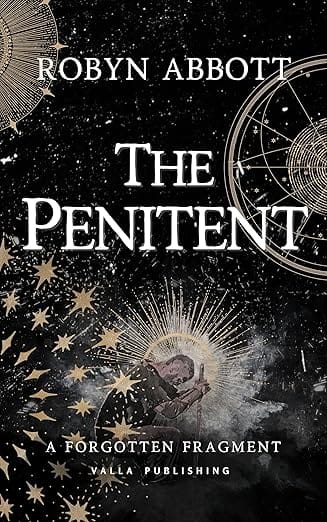Review: The Penitent by Robyn Abbott

I’ll come right out and say it. I thought The Penitent was both incredibly unique and well-crafted.
The Penitent opens with a simple enough premise, but one I’ve never encountered in fantasy. A group of peasant conscripts returns to their small village after more than a decade at war. Though the story involves the entire group, the focus is on the farmer-turned-soldier Jehan, who returns to his wife Luthra, oldest son Taspar, and daughter Sabine. The story follows Jehan and the others as they attempt to reintegrate into the society they left, all while facing what amounts to a witch hunt as suspicious citizens and government forces seek out any evil that may have returned with them.
Under the hands of a less competent and less patient writer, it would be easy for the soldiers’ return to fall into the trap of one-note problems. Happy reunions spoiled by secret affairs. The PTSD of the veterans returning home. The lack of a place for the veterans in a village that has learned to live without them. None of these problems alone would make for a poor story, but they would fail to capture the complexity of the challenges facing Jehan, his fellow soldiers, and the families that are trying to welcome them back.
The true beauty of The Penitent is how it skillfully weaves the myriad challenges of the veterans’ return into a coherent, poignant, and haunting story. Jehan and his family are the perfect choice to capture the nuances of the conflict. Jehan is eager to put the war behind him, though that’s a task far easier said than done. He carries the weight of dark memories and deeds, but is willing to work hard to bury the past and build a new future with the family he barely knows.
Luthra and the children are likewise complex. Luthra’s feelings shift from moment to moment. The man she married is not the man who returned, and though she is quick to acknowledge the benefits of having her husband back, it is no small matter to make a space for him after more than a decade of being gone.
There’s so much more to this story, too. There’s an emotion-based magic system, a young love between Taspar and a neighbor, a deeply rooted religion headed by a caring priest, tension between the neighbors, and the fear that the men have brought back evil wraiths from the war. All would be worth talking more about, but I’ll beg forgiveness as I’ll only make brief mention of them. Suffice it to say, this is a story rich with details and conflict.
I’d rather talk about how refreshing this book was to read. It’s nuanced and adult, allowing its drama and conflict to build slowly and naturally. I would call it a darker book, but it rarely bashes the reader over the head with the horrors the veterans hold within their spirits. So much of this feeling is due to the characters of Jehan and Luthra. It would be easy to imagine this book filled with shouted arguments, brief bouts of violence, and frequent tears. Instead, this book is laced with quiet tension, moments of beauty and hope, and the subtle awkwardness one would expect as two adults who don’t really know each other anymore try to build a life together. Jehan and Luthra both approach the difficulty with the best of intentions and the self-control to behave like adults. The story gives them the time and space to reveal the depths of their character through small exchanges, and it drew me completely in.
Because of the nuanced and complex interplay of characters, it would be tempting to call the book slow, but slow to me implies long stretches of time where nothing meaningful happens, and that’s certainly not the case here. Every brief chapter has a meaningful interaction that pushes the characters and the story forward. I think instead I prefer the term quiet. We don’t have big fights breaking out; there’s no single big-bad-villain that we know our characters have to defeat. There’s conflict aplenty, but it’s woven tightly within a dozen storylines, and the full story doesn’t reveal itself until the back half of the book.
Once again, I loved it. It was a refreshing change of pace after reading a few novels that essentially jumped from crisis to crisis, with bloody action around every corner. But I think it’s worth noting that this is probably a book for those who appreciate subtlety and complexity. The slow build-up is well worth the time, though, as the witch-hunt surrounding the returned veteran picks up steam and builds to a dramatic crisis at the end of the story. We’ve spent enough time with the characters and gotten to know the village and its people so well that the climax hits hard, over and over, and it was wonderful.
If I had one wish granted, it would be that we got a bit more time with the denouement. The Penitent is a stand-alone novel in a connected world, and I really would have liked another 10-15 pages more than what we get. Though the big conflicts are wrapped up nicely, there are enough minor questions that linger that I’d like just a little more to feel a complete sense of closure.
Overall, The Penitent has jumped to one of my favorite stories of the year, and it’s been a glorious year of reading. I think it will appeal most to the careful and patient reader, the one who’s willing to follow a quiet drama for a few hundred pages before the tension explodes across the page. I know it caught me at just the right time, and I enjoyed myself tremendously within these pages.
You can get the book here: The Penitent
